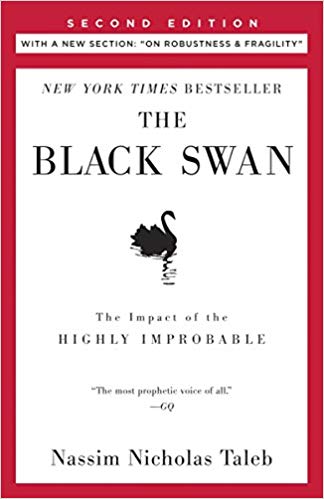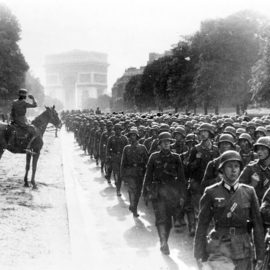

This article is an excerpt from the Shortform summary of "The Black Swan" by Nassim Taleb. Shortform has the world's best summaries of books you should be reading.
Like this article? Sign up for a free trial here .
What is a black swan event? Can you predict black swan events? Prepare for them? Avoid them?
A black swan event is an extremely unpredictable event that has a massive impact on human society. These include positive Black Swans, like the invention of the Internet and the discovery of antibiotics, as well as negative Black Swans, like the 2008 recession.
We’ll define black swan events, look at “black swan” event examples, and discuss how best to prepare for them.
What Is a Black Swan Event?
For millennia, it was universally accepted that all swans were white. In fact, this truth was so incontrovertible that logicians would often use it to illustrate the process of deductive reasoning. That classic deduction went like this:
- All swans are white
- The bird is a swan
- The bird is white
But in 1697, Willem de Vlamingh, a Dutch explorer, discovered black swans while on a rescue mission in Australia—and, in an instant, a universal, incontrovertible truth was shown to be anything but.
What is a black swan event? After Vlamingh’s discovery, philosophers used the term “black swan” to describe a seeming logical impossibility that could very well end up being possible.
Taleb, however, offers a new spin on the term “black swan event.” He uses it to describe specific historical events with specific impacts. These events have three salient features:
Features of Black Swan Events
- They are “outliers” (that is, they are statistically insignificant);
- They have profound real-world impacts; and
- Despite (or perhaps because of) their extreme unpredictability, they compel human beings to account for them—to explain after the fact that they were in fact predictable.
Some Black Swan event examples include World Wars I and II, the fall of the Berlin Wall, 9/11, the rise of the Internet, the stock-market crash of 1987, and the 2008 financial crisis.
Taleb’s thesis is that Black Swan events, far from being insignificant or unworthy of systematic study, comprise the most significant phenomena in human history. We should study them, even if we can’t predict them. Thus, counter-intuitively, we would be better served by concentrating our intellectual energies on what we don’t—nay, can’t—know, rather than on what we do and can know.
Taleb also claims, also counter-intuitively, that the more our knowledge advances, the more likely we are to be blindsided by a Black Swan event. This is because our knowledge is forever becoming more precise and specific and less capable of recognizing generality—for example, the general tendency for earth-shattering events to be completely unforeseen (which, of course, is why they’re earth-shattering).
Platonicity and the Platonic Fold
What is a black swan event? Integral to Taleb’s usage is the idea of Platonicity. Like Plato, with his abstract and ideal “forms,” human beings in general tend to favor neat, “pure” concepts that are universally consistent. These concepts—mathematical rules, notions of historical progress, economic laws—allow us to form models of the world so that predictions are much easier to make.
The problem with these models is that they lead us to “mistake the map for the territory”—that is, we are fooled into thinking the models are reality, rather than a very particular representation of reality that excludes outliers (i.e., Black Swan events).
Taleb calls this natural human tendency to box in reality Platonicity and he holds it responsible for our dangerous confidence in our own knowledge. We become so enamored of our elegant, self-consistent models that we are unable to see beyond them.
It’s where our models cease to be useful that Black Swan events occur—in the Platonic fold between our predictive models and unpredictable reality.
The Origins of Taleb’s Black Swan Obsession
Taleb’s first encounter with a Black Swan event took place in his home country of Lebanon.
Black Swan Event Example
For centuries, the region around Mount Lebanon was known for its cosmopolitanism—located on the eastern shore of the Mediterranean, at the crossroads of Europe and the Near East, it was home to a vibrant mercantile population that included Christians and Muslims of various sects, Jews, and Druze.
This tolerant and multicultural paradise was still in existence in Taleb’s youth. He recalls the motley crew of international playboys, spies, writers, and merchants that frequented the country.
Taleb was part of the country’s aristocracy. Both of his grandfathers were educated in France, and one of them was serving as minister of the interior when a teenaged Taleb was jailed for participating in a political rally that turned violent. The government was scared enough of the unrest to grant all the arrested protesters amnesty.
Shortly after the rally came the Black Swan event that launched Taleb’s obsession: A civil war between Lebanon’s Muslims and Christians that shattered the country’s millennia-long ethnic peace and reduced Beirut, Lebanon’s capital and the “Paris of the Middle East,” to rubble.
What this Black Swan event brought home for Taleb was the blunt unknowability of history. The war wasn’t—couldn’t have been—predicted; it could only be explained after the fact. He realized that human beings suffer from a “triplet of opacity” when it comes to our encounters with history:
1) The Illusion of Understanding
One reason black swan events surprise us is that we think we understand the world. We all tend to think we have a grasp of what’s going on in the world when, in fact, the world is far more complex than we know.
For example, all the adults around Taleb predicted the civil crisis would last a matter of days (it ended up lasting around 17 years). Despite the fact that events kept contradicting people’s forecasts, people acted each day as though nothing exceptional had occurred.
2) The Retrospective Distortion
History always appears predictable (or, at least, explainable) in our retrospective accounts of events. This is even the case with black swan events.
In the case of the Lebanese Civil War, the adults whose forecasts were continually proved incorrect were always able to explain the surprising events after the fact. In other words, the events always were indeed predictable, but one could only predict them after they’d already happened.
3) The Overvaluation of Facts and the Flaw of Expertise
We accumulate information and listen to expert analysis of that information, but these elements never measure up to real events.
Taleb cites the example of his grandfather, who eventually rose to deputy prime minister of Lebanon. Although his grandfather was an educated man with years of experience in politics, his forecasts were proven wrong as routinely as those of his uneducated driver. Neither knew more than the other about the twists and turns of the war.
Newspapers, too, did nothing to help the Lebanese understand the war. They communicated information, but they didn’t make anyone’s predictions any more accurate. The reporters of the war also tended to “cluster”—emphasizing the same details and using the same categories as each other. Clustering reduces the complexity of the world—and leaves us vulnerable to Black Swan events. What is a black swan event? It’s an unlikely event that has a huge impact on the world.
(When Taleb was attending Wharton, he learned about “efficient markets”—the idea that trading securities can’t produce profits because all relevant information is publicly available and thus already built into prices. Upon absorbing this idea, Taleb completely ceased to read newspapers or watch television.)
Can Anyone Prepare for Black Swan Events?
What is a black swan event, and can anyone prepare for them? In the 1980s, as the war continued to rage, Taleb found himself in business school at the University of Pennsylvania’s Wharton School. There, he discovered that the triplet of opacity didn’t just affect his countrymen—it affected his professors and the powerful corporate executives who came to lecture as well. Taleb realized that no one—not even the “smartest” businesspeople in the world—was prepared for Black Swan events.
That realization became even starker on October 19, 1987, when global stock markets crashed. This was a black swan event.
At the time, Taleb was working for Credit Suisse First Boston; his specialty, honed at Wharton, was “quantitative finance”—the application of complex mathematical models to markets to mitigate uncertainty. Taleb, however, used his knowledge as a “quant” not to apply those mathematical models directly, but to suss out where those models failed and invest accordingly. In other words, whereas everyone else was flying blind and didn’t know it, Taleb was flying blind and did know it, and he placed bets that would pay off if the models were wrong.
On the day of the crash, he was vindicated. So much so that his bonus was tantamount to “F*** you” money—that is, it was large enough that he no longer needed to work to earn money. He chose to stay in finance, but he customized his roles so that he could spend ample time in solitude and contemplation.
———End of Preview———

Like what you just read? Read the rest of the world's best summary of "Black Swan" at Shortform . Learn the book's critical concepts in 20 minutes or less .
Here's what you'll find in our full Black Swan summary :
- Why world-changing events are unpredictable, and how to deal with them
- Why you can't trust experts, especially the confident ones
- The best investment strategy to take advantage of black swants






